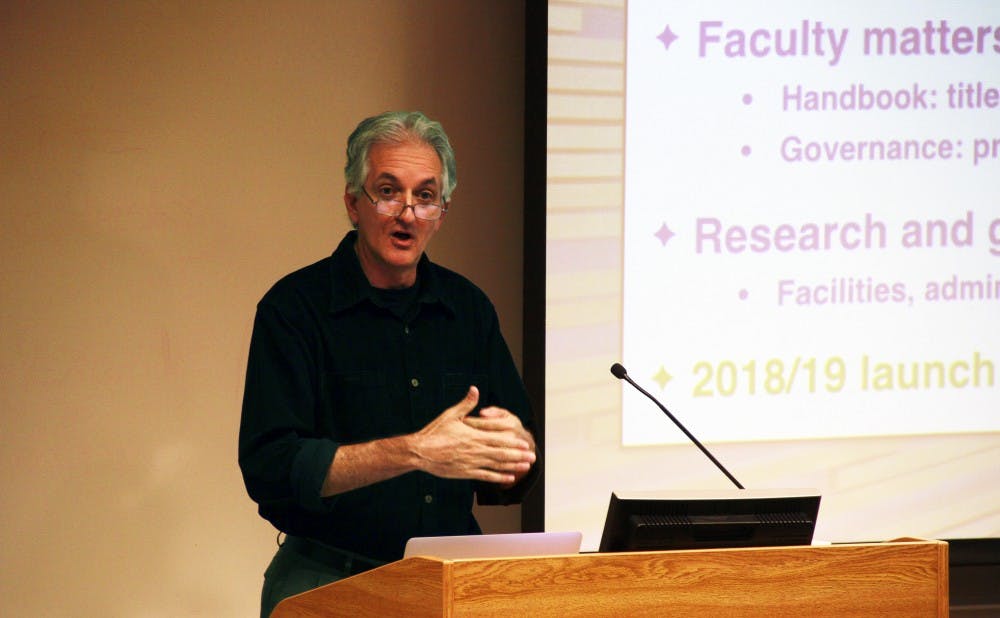Although it remains to be seen exactly how Duke will be affected by recent changes in the NCAA's structure and ongoing lawsuits regarding student-athlete benefits, administrators are watching and waiting—planning to balance the needs of both academics and athletics as they move forward.
"I've been directly involved with college athletics since the Fall of 1967, and I can honestly say I've never been so uncertain about the future—about where we're going to be in a year, in two years, in three years," Chris Kennedy, senior deputy director of athletics, told the Academic Council Thursday.
Kennedy presented to the Council with James Coleman, chair of the Athletic Council and John S. Bradway professor of the practice of law. Although the Athletic Council typically presents to the Academic Council once each Spring, Thursday's presentation was specially scheduled to allow discussion of the recent changes. Anchoring the agenda was the "autonomy proposal" approved by the NCAA in August, which allows the Power 5 athletic conferences greater independence and will likely result in increased benefits for student-athletes, Kennedy explained.
Under the new structure, members of the five most powerful conferences—the ACC, Big Ten, Big 12, Pac-12 and SEC—are able to pass their own legislation, as opposed to the "one size fits all" model of the former system, which applied the same regulations to all member institutions despite a wide range of school size and resources. With the Power 5 able to set their own guidelines, benefits for student-athletes in the conferences will likely expand, Kennedy said. He cited offering long-term medical coverage and paying the full cost of attendance as possible upcoming changes.
But the governance change could open the door for more significant changes down the road, he noted—though it is impossible to determine exactly what those could be.
"I just can't predict what this autonomy movement is going to mean, what it's going to mean for the NCAA as a whole, what it's going to mean for Duke," Kennedy said.
President Richard Brodhead noted that changes to the system should not mean compromises in a strong commitment to the education of student-athletes—adding that the presidents of other ACC institutions shared this view, "even schools that you might think otherwise about."
"As it pertains to this new autonomy legislation, you will find in me a supporter of everything that strengthens the education that these institutions give to their student-athletes," Brodhead said.
Adding a further layer of complexity to the question of student-athlete benefits is a set of ongoing antitrust lawsuits against the NCAA, Coleman noted. Led by former University of California at Los Angeles basketball player Ed O'Bannon, a group of former Division I football and basketball players have challenged the NCAA's use of players' images for commercial purposes.
An initial ruling found that the NCAA's regulations violate antitrust laws by restraining trade and competition among member universities. Appealed by the NCAA, the ruling stands to fundamentally change the system of recruiting and compensating student-athletes.
"The broadest argument here is that universities ought to be able to pay prospective student-athletes whatever they can pay, and then let the student basically go to the university that's willing to pay the most for his or her services," Coleman said.
He added, however, that a change to the system will not necessarily mean a change for Duke. Though the lawsuits stand to open the possibility of paying student-athletes and offering them various benefits, schools would not be forced to do so—and whether or not Duke would is an open question.
"The important thing to know about antitrust laws is that it wouldn't require Duke to do anything differently," Coleman said. "It simply frees Duke to offer more in scholarships.... But Duke wouldn't be required, and the NCAA and ACC could not require Duke to do any of that. But it becomes, then, a matter of how do you compete against other schools who have the very top athletes?"
He noted that the lawsuits raise a large set of hypothetical possibilities for Duke to consider—and although the University will work to maintain its principles, particularly its balance between academics and athletics—the road ahead is uncertain.
"We don't know what the world is going to look like when you have the possibility of an arms race," Coleman said. "That's the problem here."
In other business:
Ted Pappas, professor of surgery and vice dean of medical affairs, presented a proposal for the division of neurosurgery to become its own department. The transition would allow the new department to be more competitive in terms of recruiting faculty and securing funding, Pappas said. The proposal will be presented to the DUHS Board of Directors for approval in April 2015.
Get The Chronicle straight to your inbox
Signup for our weekly newsletter. Cancel at any time.

